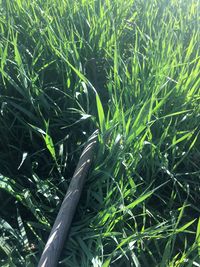City of Boulder OSMP Bidding Process

The City of Boulder, along with Boulder County, owns the majority of agricultural land in our area and they lease this land out to farmers who manage it.
Over the past several years our farm, Jacob Springs Farm, has submitted bid proposals for a total of 11 properties, all within one mile of our farm (land prices are so high and the city owns so much of the agricultural land that it’s very difficult to expand without leasing land.) Time and time again our well-researched and extensive proposals have been turned down in favor of other, less sustainable and less desirable farms.
For years we have attempted to find out what we could do to make our proposals more attractive and to understand how the decisions were being made. City staff have told us that our bids themselves were fine, and then proceeded to give us a variety of reasons why we were not awarded the bid - reasons that did not make much sense ranging from questionable to illegally discriminatory (City staff “gave it to them because they come from an “old farm family” - whereas Andre, an immigrant, came to Boulder as a child - isn't this discrimination based on ancestry?) Even though winning bids are supposed to be public record, for years our requests have been ignored. This year, confused and puzzled at being denied once again we escalated the process until we had some answers.
What We Found
When we finally received some of the bids that won out, we were shocked and confused. We are publishing the results so that you can see for yourself the kinds of decisions that are being made.
- Andre's Analysis of Bid History
- Andre's Summary of all the bids
- Winning bid for the King Hodgson Properties
- Losing bid for the King Hodgson Properties
Call to Action
Join us on Wednesday, May 9th at 5:45 in the Boulder Council Chambers (1777 Broadway) to tell the Open Space Board of Trustees that we need them to do better!
Did you know that your public land is being mishanded? Here’s some recent decisions:
- A competitive Organic and sustainable proposal was passed over, and a large parcel of land was awarded to a conventional farmer who proposed in his bid, to spray a dangerous neurotoxin which is known to be toxic to fish, directly into a ditch? (an off-label use!)
- A conventional farmer with over 2,000 acres turned in a sloppy one-page proposal to grow hay for horses using conventional synthetic fertilizers and pesticide applications, his bid was for $5,500 annual rent. An extensive proposal from a respected local organic farmer bid $10,600 for the same property and lost.
- Several parcels totaling 157 acres were awarded to an inexperienced farmer who doesn’t own a tractor, baler, swather or a rake when the bid criteria clearly stated that “Ability to meet equipment requirements” was a major criterion for the decision. How are these decisions being made?
What We Want
- We want the proposals awarded this year to be re-bid by an objective, outside party ASAP. For hay properties, this should happen year.
- We want an Open and Transparent bidding process that makes land-allocation decisions objectively on the basis of the published criteria, possibly including public comment.
- We want the City staff to apply the following principles enumerated in the Agricultural Resource Management Plan
- To encourage and support the next generation of farmers and ranchers
- To expand the variety of agriculture operations on OSMP lands as appropriate with a focus on diversified vegetable/pastured livestock farming and micro dairies.
- To introduce new operations based on market needs, working closely with existing farmers and ranchers
- To avoid impairment of existing successful operations
- To “Update business practices... to maintain fairness in value, transparency in process, and fiscal responsibility.”
